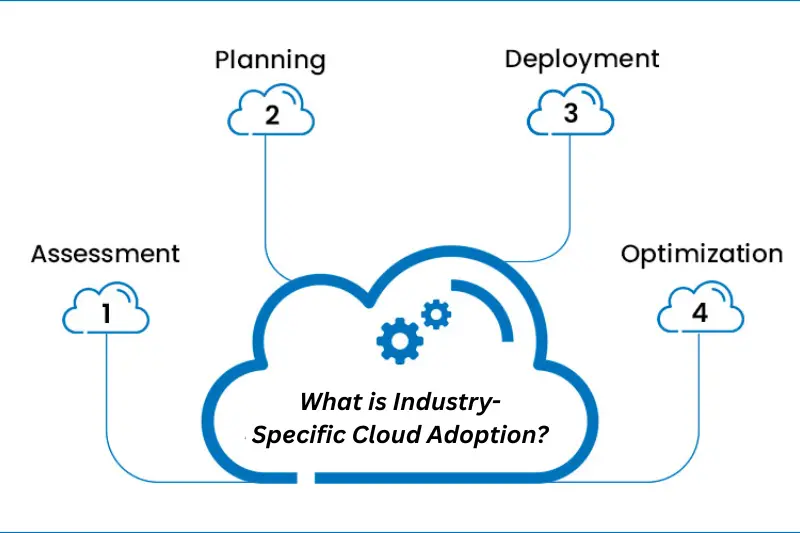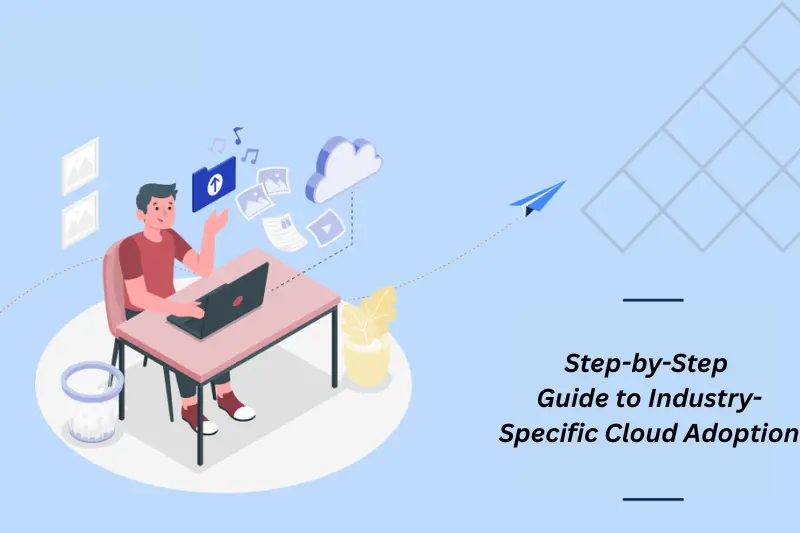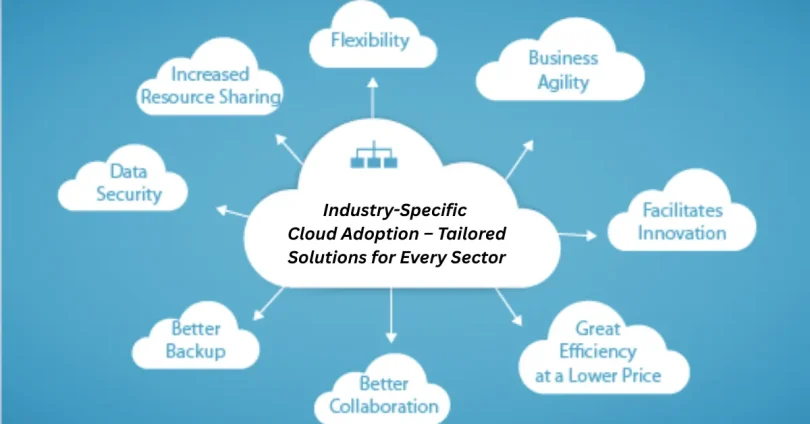Introduction
In today’s fast-changing digital world, one-size-fits-all cloud solutions no longer meet every business need. Different industries face unique challenges—whether it’s data privacy in healthcare or real-time analytics in retail. That’s where Industry-Specific Cloud Adoption – Tailored Solutions for Every Sector comes in. These customized cloud strategies help businesses get exactly what they need—security, performance, flexibility, or compliance—based on their specific goals and industry demands. In this blog, we’ll explore how different sectors are using the cloud in 2025 and why a personalized approach is now more important than ever.
What is Industry-Specific Cloud Adoption?

Industry-Specific Cloud Adoption means using cloud computing solutions that are specially designed to meet the needs of a particular industry. Instead of using general-purpose cloud services, businesses choose tools, platforms, and features that match their industry’s specific requirements.
For example:
- A healthcare provider might need secure storage for patient data that complies with HIPAA regulations.
- A financial company may need high-level encryption and real-time fraud detection systems.
- An e-commerce business might focus on fast website performance, scalability during peak sales, and smart inventory tools.
These customized solutions help organizations improve performance, stay compliant, and gain a competitive edge—making cloud adoption more efficient and effective for each sector.
You may also like it:
Cloud Compliance Requirements – Ensure Secure & Lawful Cloud Operations
Securing Multi-Cloud Environments – Strategies for Safer & Smarter Cloud Protection
Top Cloud Security Tools 2025 – Protect Your Data with Trusted & Powerful Solutions
Why Industry-Specific Cloud Adoption is Important
Meets Unique Industry Requirements
- Customized Features: Every industry has its own needs—custom cloud tools help address those precisely, whether it’s real-time analytics or secure patient records.
- Compliance Support: Tailored solutions are built to meet sector-specific regulations like HIPAA, GDPR, or PCI-DSS without extra setup.
- Optimized Performance: Industry-focused cloud platforms are fine-tuned for the kind of workloads and data types your business deals with daily.
Boosts Efficiency and Productivity
- Automated Workflows: Sector-based cloud tools streamline operations, reducing manual work and saving time.
- Faster Deployment: Pre-built templates and configurations for your industry speed up implementation and reduce setup errors.
- User Familiarity: Employees adapt quicker to tools designed around their industry’s standard processes and terms.
Improves Security and Compliance
- Built-in Safeguards: Industry-specific clouds often come with advanced security tools made for your data type and risk level.
- Data Localization: Some sectors need local data storage—custom solutions make this easier while following regulations.
- Audit and Monitoring: Sector-based solutions often include compliance reporting and monitoring features by default.
Enhances Customer Experience
- Personalized Services: Tailored cloud solutions help companies offer more relevant and personalized services to their customers.
- Faster Response Times: Optimized infrastructure leads to quicker transactions, lower latency, and better user satisfaction.
- Data-Driven Insights: Industry clouds offer insights based on sector-specific KPIs, helping businesses improve customer interactions.
Supports Innovation and Scalability
- Future-Ready Tools: Custom solutions often include AI, machine learning, or IoT tools tailored to your industry’s future trends.
- Flexible Growth: Whether it’s expanding to new markets or handling seasonal traffic, these platforms scale easily with your business.
- Faster Experimentation: Tailored environments let teams test new ideas quicker without risking core business operations.
Step-by-Step Guide to Industry-Specific Cloud Adoption

Step 1: Identify Your Industry Needs
- Start by analyzing your industry’s unique challenges, compliance rules, and operational demands. Understand what your business truly needs from the cloud—security, speed, scalability, or all three.
Step 2: Define Clear Business Goals
- Set clear, measurable goals like reducing IT costs, improving data security, or enabling faster customer service. These goals will guide your cloud selection and implementation process.
Step 3: Choose the Right Cloud Model
- Decide between public, private, hybrid, or multi-cloud based on your industry needs. For example, healthcare may benefit from private or hybrid clouds for better data control.
Step 4: Select a Cloud Provider with Industry Expertise
- Look for providers that offer industry-specific solutions and have a strong track record in your sector. AWS, Azure, and Google Cloud offer tailored services for finance, healthcare, manufacturing, and more.
Step 5: Customize Cloud Services to Fit Your Workflow
- Work with the provider to configure your cloud environment—choose services, tools, and integrations that match your business processes and regulatory needs.
Step 6: Focus on Compliance and Security
- Ensure the cloud setup meets industry regulations like HIPAA, PCI-DSS, or GDPR. Use built-in tools for encryption, access control, and audit trails to stay secure and compliant.
Step 7: Train Your Team
- Provide training to help your staff understand and use the new cloud tools efficiently. This helps avoid resistance, boosts productivity, and ensures a smoother transition.
Step 8: Monitor and Optimize Performance
- Use monitoring tools to track usage, uptime, and performance. Continuously optimize your cloud setup to improve speed, reduce costs, and maintain reliability.
Step 9: Scale as Your Business Grows
- Take advantage of the cloud’s scalability to expand services, add features, or enter new markets. Make sure your solution is flexible enough to grow with your business.
Step 10: Stay Updated with Industry Trends
- Cloud technologies are evolving fast. Keep track of new updates, tools, and regulations relevant to your industry to maintain a competitive edge.
Advantages and Disadvantages of Industry-Specific Cloud Adoption
| Advantages | Disadvantages |
| Tailored Solutions Cloud services are customized to meet the unique needs of each industry, improving performance and efficiency. | Higher Costs Customized solutions may cost more than standard cloud services due to added features and specialized support. |
| Better Compliance and Security Industry-focused cloud providers offer built-in tools and features that help meet regulatory standards like HIPAA, GDPR, or PCI-DSS. | Vendor Lock-In Relying on a provider’s proprietary industry tools can make it difficult to switch platforms in the future. |
| Faster Implementation Pre-configured tools and templates allow quicker deployment compared to general-purpose cloud setups. | Limited Flexibility Across Industries A solution tailored for one industry may not work well if the business expands into another sector with different needs. |
| Improved Productivity Employees can work more efficiently using tools that align with their specific workflows and industry standards. | Complex Setup and Integration Customization requires careful planning and expertise, which can slow down the adoption process. |
| Scalability and Flexibility Businesses can easily scale resources up or down based on seasonal demand or growth, without compromising performance. | Dependence on Provider’s Industry Knowledge If the provider lacks deep industry expertise, the solution may fall short of meeting critical business needs. |
You may also like it:
Cloud Security Best Practices 2025 – Protect Your Data with Smarter & Safer Strategies
Real-Time Data Processing with AI – Faster Insights & Smarter Decisions
Top Benefits of AI Cloud Integration – Smarter Faster & Scalable Business Solutions
Frequently Asked Questions (FAQs)
What is industry-specific cloud adoption?
It means using cloud services that are specially designed to fit the needs of a particular industry, like healthcare, finance, or retail.
Why should businesses choose tailored cloud solutions?
Because every industry has different needs—custom solutions help meet compliance rules, improve security, and boost performance.
Are industry-specific cloud services more expensive?
They can cost more than general cloud services, but they offer better value by saving time, reducing risks, and improving efficiency.
Can small businesses also use industry-specific cloud solutions?
Yes, many providers offer scalable plans that work well for both small and large businesses in any industry.
How do these solutions help with compliance?
They come with built-in features that follow industry rules, like data protection laws and security standards.
What industries benefit the most from cloud customization?
Healthcare, finance, retail, manufacturing, education, and media are some of the top industries that benefit from tailored cloud services.
Is it difficult to switch providers after choosing an industry-specific cloud?
It can be challenging due to custom setups, but good planning and the right tools can make the transition easier.
Do I need special training for industry-specific cloud tools?
Some training may be needed, but most providers offer help, guides, and support to get your team up to speed.
Conclusion
Industry-Specific Cloud Adoption is no longer a luxury—it’s a smart move for businesses that want to grow, stay secure, and meet unique industry demands. By choosing cloud solutions tailored to your sector, you can boost performance, ensure compliance, and deliver better results. In 2025 and beyond, the future belongs to businesses that use the cloud in a way that truly fits their field.
Bonus Points
- Edge Computing Integration
Many industry-specific solutions now include edge computing to process data closer to the source, reducing latency and improving speed. - AI and Automation Tools
Cloud providers are adding built-in AI features for sectors like finance (fraud detection), healthcare (diagnostics), and retail (recommendation engines). - Disaster Recovery Plans
Customized cloud setups often include industry-relevant disaster recovery solutions to keep your business running during unexpected downtime. - IoT-Ready Architecture
Industries like manufacturing and logistics benefit from cloud platforms that are ready for Internet of Things (IoT) devices and real-time data tracking. - Green Cloud Options
Some providers offer sustainable, eco-friendly cloud services that help industries meet their environmental goals while reducing energy costs. - 24/7 Industry-Specific Support
Many cloud vendors now provide dedicated support teams with industry expertise for faster and more relevant assistance. - Built-in Analytics Dashboards
Tailored cloud solutions often come with ready-to-use dashboards showing industry-specific KPIs for better decision-making.
You may also like it:
AI-Driven Cloud Analytics – Smarter Data Insights for Modern Businesses
Intelligent Cloud Platforms – Smart Scalable & Secure Computing Solutions
Top Cloud-Based Machine Learning Tools in 2025 – Features Benefits & Use Cases
AI in Cloud Computing 2025 – Latest Trends Innovations & Future Insights




